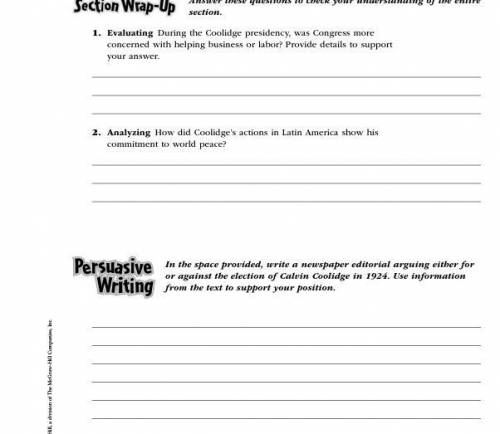Chapter 10, Section 2 (Pages 308-311)
Desire for Normalcy
Read the passage below then do the...

Chapter 10, Section 2 (Pages 308-311)
Desire for Normalcy
Read the passage below then do the worksheet.
Warren G. Harding and Calvin Coolidge were the Republican candidates for president and vice president in 1920. They promised a return to “normalcy” and won the election eas-ily. After the election, Harding appointed several skilled people to his cabinet. However, he also gave some government jobs to political supporters who were not qualified. Some of these offi-cials were dishonest. The biggest scandal during the Harding presidency involved Albert Fall, the secretary of the interior. He secretly leased, or rented, oil reserves owned by the government to two oil compa-nies. In exchange, he was paid more than $400,000. Fall was convicted of bribery and went to prison. Because one of the oil reserves was in Teapot Dome, Wyoming, the scandal became known as Teapot Dome. Harding died in 1923, and Calvin Coolidge was sworn in as president. Coolidge was known for his honesty. After he took office, Coolidge allowed the investigations into the Harding scandals to continue. Coolidge also replaced est officials with honest ones. Harding and Coolidge had similar beliefs about how the gov-ernment should be run. Both thought that government should not interfere in the life of the nation. This is known as a laissez-faire approach to government. During the Coolidge presidency, Congress passed laws to sup-port business. It lowered tax rates for corporations and wealthy Americans. It raised tariffs on imported goods to protect American businesses. Laws that regulated child labor and women’s wages were overturned. Coolidge’s policies were popular. He won the 4 presidential election with 54 percent of the popular vote. Harding and Coolidge believed that the United States should be involved in world affairs as little as possible. This policy is called isolationism. The policy of isolationism kept the United States out of the League of Nations. However, Harding and Coolidge still worked for world peace. In 1922 the United States joined Japan, Britain, France, and Italy in signing the Five-Power Treaty. This treaty limited the size of these nations’ navies. In 1928 the United States was one of 15 nations that signed the Kellogg-Briand Pact. This pact called for outlawing war. Coolidge also reduced the number of U. S. troops in Latin America. American troops had been stationed in the Dominican Republic and Nicaragua since the early 1900s to protect American business interests there. After elections were held in these two countries in the 1920s, the United States withdrew its troops. Coolidge decided not to send troops to Mexico when the Mexican government threatened to take over foreign-owned oil and mining companies. Instead, Coolidge chose to negotiate.


Answers: 3
Other questions on the subject: History

History, 21.06.2019 17:50, Ladarius566
What made the middle colonies different from new england and the southern colonies?
Answers: 1

History, 21.06.2019 21:00, ayoismeisalex
This law states that the "chinese laborers to this country endanger the good order of certain localities" in the united states. which of these would represent a "locality" that would most likely have wanted this law created and passed? a) dallas b) chicago c) atlanta d) san francisco
Answers: 1

History, 21.06.2019 23:30, britorre7609
What two arguments is franklin d. roosevelt making in this excerpt from his "four freedoms" speech? four freedoms by franklin d. roosevelt (excerpt) it is true that prior to 1914 the united states often had been disturbed by events in other continents. we had even engaged in two wars with european nations and in a number of undeclared wars in the west indies, in the mediterranean and in the pacific for the maintenance of american rights and for the principles of peaceful commerce. but in no case had a serious threat been raised against our national safety or our continued independence. what i seek to convey is the historic truth that the united states as a nation has at all times maintained clear, definite opposition, to any attempt to lock us in behind an ancient chinese wall while the procession of civilization went past. today, thinking of our children and of their children, we oppose enforced isolation for ourselves or for any other part of the americas. that determination of ours, extending over all these years, was proved, for example, during the quarter century of wars following the french revolution. while the napoleonic struggles did threaten interests of the united states because of the french foothold in the west indies and in louisiana, and while we engaged in the war of 1812 to vindicate our right to peaceful trade, it is nevertheless clear that neither france nor great britain, nor any other nation, was aiming at domination of the whole world. a) americans should hold on to their isolationist tendencies as long as their own interests are not under threat. b) americans have always fought to uphold human rights and correct injustices against them. c) americans have always been peaceful but should be willing to go to war to defend their allies. d) americans should go to war to protect their allies against the germans and assert their world domination. e) americans should continue to maintain their freedom even in the face of world domination.
Answers: 1
Do you know the correct answer?
Questions in other subjects:

Social Studies, 04.03.2021 23:10


Mathematics, 04.03.2021 23:10


Computers and Technology, 04.03.2021 23:10

Mathematics, 04.03.2021 23:10

Mathematics, 04.03.2021 23:10

Geography, 04.03.2021 23:10

Chemistry, 04.03.2021 23:10

Mathematics, 04.03.2021 23:10






